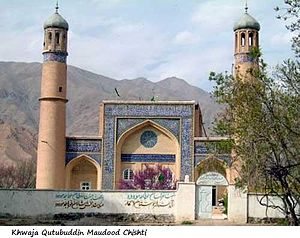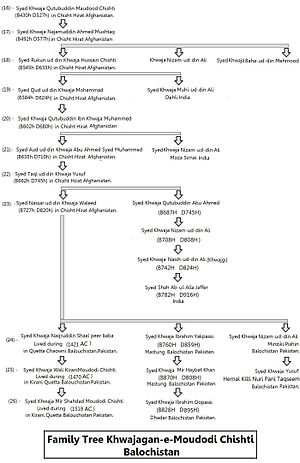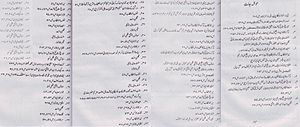- Maudood Chishti
-
This article is part of the series: Islam 
Maudood Chishti (also known as Qutubuddin, Shams Sufiyaan and Chiraag Chishtiyaan) was an early day Sufi Saint, a successor to his father and master Abu Yusuf Bin Saamaan, twelfth link in the Sufi silsilah of Chishti Order, and the Master of Shareef Zandani. He was born around 430 Hijri in the city of Chisht. He initially received education from his father. He memorized Qur'an by the age of 7, and completed his education when he was 16. His work includes two books Minhaaj ul Arifeen and Khulaasat ul Shariah. He died in the month of Rajab at the age of 97 in 533 AH.(March 1139 C.E) He was buried at Chisht like many of the early Chishtiyya.[1]
Contents
Tasawuf
Hazrat Khwaja Al Mawdud Chisti became the mureed of Hazrat Khwaja Nasir Abu Yusuf Bin Saamaan Chisti. After he became a mureed his murshid (Master) addressed him by saying, "Oh Qutubuddin Mowdud, adopt the path of the Faqr." The word faqar is literally translated as poverty, but in the language of tasawwuf, to be rich with Allah. It is for one to have total trust in Allah and not to be dependent on any other than Allah. Faqar is the way of true dervishes. Khwaja Mawdud Al Chisti accepted his murshids (spiritual guidance) advice. Shortly after he went to seclusion and remained absorbed in worship of his Creator for twenty years. During this period he rarely ate and was reported to complete two recitation of the quran during day and two during the night. He also used to constantly make the zikr of La Ilaha Illallah. Due to all his consistent worship, everything happening in the universe became apparent to him, and nothing was kept hidden.
Khwaja Maudood's Kulifa
Khwaja Mawdud Chishti visited Balkh (the place of birth of Jalaluddin Rumi) and Bukhara , a place mentioned in the famous line of Hafez"If that Turk of Shiraz would take my heart in his hand, i would give for his Hindu mole both Bukhara and Samarkand". Khwaja Haji Sharif Zindani,his successor, renounced all and everything.He led a life of strict seclusion for 40 yearsand hated society.He used to live on leaves of trees.Although several of the Chishtiyya stressed the value asceticism, in general they say that seclusion and ascetic practice is for short periods only.You should live in the midst of society than keep your spiritual ideals. It is said that the followers of Khwaja Qutubuddin were around 10, 000 not including close friends and allies. It is impossible to enumerate Khwaja Mawdud's Khulafa. For the sake of barakat, a few are mentioned hereunder.
- Khwaja Abu Ahmed
- Khwaja Ahmad Zandani
- Shah Sanjan
- Shaikh Abu Nasseer Shakeeban
- Shaikh Hassan Tibti
- Shaikh Ahmed Baderoon
- Khwaja Sabz Paush
- Shaikh Uthman Awwal
- Khwaja Abul Hassan
Among them the link in this (CHISTI) Silsila is Khwaja Shareef Zindani who we will soon discussed. That is why his message spread so fast and so far and wide. His influence was not just limited to Hirat but spread in the west to Khurasan, Iraq, Syria and Hijaz and in the south to Iran ,Siestan and the subcontinent. In the west your message was spread by the likes of Sharif Zindani, Khwaja Usman Barooni. Khwaja Qutubuddin was 29 when his father died and he inherited the throne. He never visited the rich or went to the royal courts. He was a simple man who led a simple life. He was always courteous to the needs of others. He always was the first to greet people and respected everyone. [2]
Books
Chisti's works include two books: Minhaaj ul Areifeen and Khulaasat ul Shariah.
Sayings
- . The lover of sama’ (Sufi music) is a stranger to the outside world, but is a friend to God.
- . The mysteries of sama’ are inexplicable. If you reveal them you are liable to punishment.
Miracles
- Moulana Zakariyah says: “Khwajah Maudood Chisti acquired the capabilities known as Kash-e-Quloob (revelations of the conditions of the hearts) and Kashf-e-Quboor (revelation of the conditions of the graves).”[3]
- Whenever Khwaja Maudood Chishti wanted to see the Ka’aba, angels airlifted it to the land of Chisht.[4]
- Khwaja Qutbuddin Maudood Chishti’s dead body flew in the air on its way to the graveyard. Khwaja Fareeduddin Ganj Shakar upon narrating this fell unconscious.[5]
Descendants
Khwaja Maudood Chishti's son Khwaja Najamuddin Ahmed Ahmed Mushtaq Bin Moudod Chishti buried at Chisht. Syed Abul Alla moudodi was also a descendant of his who was born at Aurangabad India in 1903 Hijri[clarification needed]. Many of his descendants still live in the area. A very famous descendant of his, Khwaja Nizam-ud-din Alli's tomb is in the vicinity of Pishin city of Balochistan in a place called Minziki, which is still home to many of his descendants. Khwaja NaqruddinChishti Moudodi (Shaal Pir Baba) is another well known descendant whose tomb is in the capital city (Quetta) of Balochistan, located in Quetta chaowni near the old fort. Khwaja Wali Kirani Moudodi Chishti Kirani and Khwaja Mir Shahdad Moudodi Chishti Kirani are also Khwaja Maudood Chishti's descendants. The tombs of both these famous saints are in a place called Kirani, west of Quetta city. A large number of his descendants still live in Kirani. Last but not the least Khwaja Ibrahim Yukpassi another important saint belonging to Khwaja Maudood Chishti's family is buried in Mastung Balochistan and Khwaja Dopassi is buried in Dhadar near the beginning of Bolan pass Balochistan Pakistan. Descendants Khwaja Qutubuddin Mohammad Thani Chishti got migrated to Sindh Old Bukkhar ( near Shahdadkot). One of this family descendants named Khwaja Assadullah Kunjnashin Bukkhari migrated to Nawada-Gaya areas of Bihar(India). His followers preached Islam and guided the Muslims there. Khwaja Abdullah Chishti and Hazrat Taj Mahmood Haqqani Chishti were the Sufi saints of Chishti order and direct descendants of Maudood Chishti's son. Their shrines are situated in Milkitola Chhota Sheikhpura, Narhat block near Hisua (GPRS 24 83N 85 43E)
Descendants in Balochistan Pakistan
In the valley of shal kot (Quetta) and Bolan in the Balochistan province the influence of the Moudodi family reached within the lifetime of the head of the family. According to one source Khwaja Qutubuddin Moudod visited the area at least once. He came to the home of his follower Shiekh Babut in the area of Shoroak. Shiekh Babut belonged to the pashtoon tribe called 'Bariech'. During the lifetime of Khwaja Moudod Chishti his friends and followers started to spread the message of Islam. Later on Khwaja Qutubuddin Moudod Chishti's own family (the sadat) advanced the message of Islam in greater Balochistan and moulded the life of ordinary people according to the ideology of islam.
- (16) - Syed Khwaja Qutubuddin Maudood Chishti in Chisht Hirat Afghanistan.(B430h D527h)
- (17) - Syed Khwaja Najamuddin Ahmed Mushtaq in Chisht Hirat Afghanistan (B492h D577h)
- (18) - Syed Rukun ud din Khwaja Hussain Chishti in Chisht Hirat Afghanistan.(B545h D635h)
- (19) - Syed Qud ud din Khwaja Mohammad in Chisht Hirat Afghanistan. (B584h D624h)
- (20) - Syed Khwaja Qutubuddin Ibn Khwaja Muhammed (B602h D680h)
- (21) - Syed Aud ud din Khwaja Abu Ahmed Syed Muhammed in Chisht Hirat Afghanistan. (B635h D710h)
- (22) - Syed Taqi ud din Khwaja Yusuf in Chisht Hirat Afghanistan. (B662h D745h)
- (23) - Syed Nassar ud din Khwaja Waleed in Chisht Hirat Afghanistan. (B727h D820h)
- Shaal Pir Baba - Syed Shaal Pir Baba chishti Moudodi . Quetta.
- (24) - Syed Khwaja Wali Kirani Moudodi Chishti in Kirani Quetta Balouchistan Pakistan.
- (25) - Syed Khwaja Mir Shahdad Moudodi Chishti in Kirani Quetta Balouchistan Pakistan.
Shijra-e-tareekat
Main source:
Early Sufis which, though not part of a formal order, are part of the spiritual chain:
- Hasan al-Basri (died 110 AH)
- Abdul Waahid Bin Zaid (died 176 AH)
- Fudhail Bin Iyadh (died 187 AH)
- Ibrahim Bin Adham (died 162 AH)
- Huzaifah Al-Mar’ashi (died 202 AH)
- Abu Hubairah Basri (died 287 AH)
- Mumshad Dinawari (died 298 AH)
Start of the Chishti Order:
- Abu Ishaq Shami (died 329 AH)
- Abu Ahmad Abdal (died 355 AH)
- Abu Muhammad Bin Abi Ahmad (died 411 AH)
- Abu Yusuf Bin Saamaan (died 459 AH)
- Maudood Chishti (died 527 AH)
- Shareef Zandani
- Usman Harooni
- Moinuddin Chishti
- Qutbuddin Bakhtiar Kaki
- Fariduddin Ganjshakar
Family tree
- (1) -- Imam Ali ibn Abu Talib Amir al-Mu'minin Buried at the Imam Ali Mosque in Najaf , Iraq .{March 17, 599 --- February 28, 661 aged 61}
- (2) -- Imam Husayn ibn Ali Sayed al- - Buried at the Imam Husayn Shrine in Karbala, Iraq. (B4h D60h)
- (3) -- Imam Ali ibn Husayn al-Sajjad, Zayn al-ʿĀbidin Buried in Jannat al-Baqi Medina.(B-h D94h)
- (4) -- Imam Muhammad ibn Ali al-Baqir al-Ulum Buried in Jannat al Baqi Medina.(B-h D114h)
- (5) -- Imam Ja'far al-Sadiq al-Sadiq - in Jannat al-Baqi Medina.(B80h D148h)
- (6) -- Imam Musa al-Kadhimal-Kazim in the Kadhimiya in Baghdad Iraq .(B128h D183h)
- (7) -- Imam Ali ibn Musa al-Rida, Reza in the Imam Reza shrine Mashad.(B153h D203h)
- (8) -- Imam Muhammad ibn Ali al-Taqi, al-Jawad in the Kadhimiya in Baghdad Iraq.(B195h D220h)
- (9) -- Imam Ali al-Hadi al-Hadi, al-Naqi in the Al Askari Mosque in Samarra Iraq.(B214h D254h)
- (10) - Syed Imam Abdullah Ali Akbar (B238h D292h)
- (11) - Syed Imam Syed Abu Muhammed Al Hussain in Chist Hirat Afghanistan. (B---h D352h)
- (12) - Syed Abu Abdullah Muhammed in Chisht Hirat Afghanistan. (B270h D324h)
- (13) - Syed Abu Jaffer Ibrahim in Chisht Hirat Afghanistan.(B-h D370h)
- (14) - Syed Shams-ud-din Abu Nassar Muhammed Saman in Chisht Hirat Afghanistan. (B-h D398h)
- (15) - Syed Khwaja Abu Yusuf Bin Saamaan Nasir-ud-din Abu Yusuf Bin Saamaan in Chisht Hirat Afghanistan. (B375h D459h)
- (16) - Syed Khwaja Qutubuddin Maudood Chishti in Chisht Hirat Afghanistan.(B430h D527h[6]
Family tree (mother's side)
(Referenced from the book: Khwaja Ibrahim Yakpassi Chishti)
- Amir-ul-momineen imam Hassan Raziallahtalla anha
- Hazrat Syed Hassan Musna
- Hazrat Syed Abdullah-al-Mahaz
- Hazrat Syed Nasir-ud-din Hassan
- Hazrat Syed Mujdad-al-maale
- Hazrat Syed Hassan
- Hazrat Syed Yahya
- Hazrat Syed Ibrahim
- Hazrat Syed Sultan Firsinafa
- Hazrat Syed Khwaja Abu Ahmed Abdal Chishti
- Hazrat Syeda Bibi Khizamatullah Taala Hassani (Mother of Abu Yusuf Bin Saamaan)
- Hazrat Maudood Chishti
Images
See also
- Kirani
- Gulzar
- Abu Yusuf Bin Saamaan
- Khwaja Najamuddin Ahmed
- Khwaja Hussain Chishti
- Khwaja Qutubuddin
- Shaal Pir Baba Khwaja Naqruddin
- Khwaja Wali Kirani
- Khwaja Ibrahim Yukpasi
Notes
- ^ [1] The big five of India in Sufism: holy biographies of 1. Hazrat Khwaja ... By Wahiduddin Begg
- ^ [2] Real achievement of the human life
- ^ Malfozat-e-Khwaja Fareeduddin Ganjshakar
- ^ (Malfoozat Khwaja Qutubuddin Bukhtiar Kaki, Fariduddin Ganj Shakar)
- ^ (Rahatil-Quloob, Ganj Shakar)
- ^ )[3] Ref Book:Khwaja Ibrahim Yakpassi Chishti by Professor Syed Ahmed Saeed Hamdani, Page, 56 Yakpassi Trust Mastung-Balochistan
References
- The Big Five of India in Sufism [4]
- Pakistan, a Political Study [5]
- A Guide to the Islamic Movement [6]
- Tazkara-e-Syed Moudodi,idara-e-maarife Islam, Mansoora Lahore
- Sair-ul-aolia,Urdu and Persian edition, written by Amir Khurd
- Maraat-ul-israr by Hazrat Khwaja Abdul Rehman Chishti Quds Sira
- Trirekh-e-mashaikh-e-Chisht by Doctor inam-ul-Haq
- Safinat-ul-Arifeen
- Tazkara-e-Ghuas o Qutub
- Shijra-e-Maoroosi Sadat Kirani
- The mashkiah of Chisht by Shiekh Muhammed Zakariyya Kandhalwi
- The Origin Of Chishti Order
Categories:- Sufi saints
- Sufi religious leaders
- Chishti Order
Wikimedia Foundation. 2010.


























